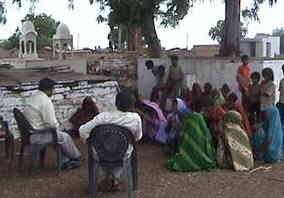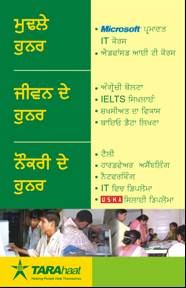|
TARAhaat Helping People Help Themselves Marketing computer training courses to women in remote villages is not easy, but with a lot of innovation and perseverance the TARAhaat team has achieved the near impossible
t was a scorching afternoon in May, when two executives of TARAhaat were traveling in the two villages of Haryana. Their aim was to research the potential of computer education for women in rural areas. They had been trying to encourage female participation in their centre by running a number of promotional campaigns but they were not able to get them. The strong cultural and social norms prevalent in the rural areas made it difficult to attract girls to the TARAhaat centres.The villagers believed computer education or higher education was not essential for girls. After a number of meetings with the girls and older women, the marketing team decided that they had to formulate a different marketing plan to achieve success in new enrolments. The plan must aim at teaching these girls basic computer in their own villages, that too by a local female trainer. Mobile Master Trainer The overwh-elming response to the pilot phase of Mobile Master Trainer in Sohna (Haryana) and Jhansi encouraged TARAhaat’s marketing team to launch this promotional programme in all other TARAhaat Centres. Three Mobile Master Trainers got 61 female students in their own villages in the initial pilot phase. The concept of Mobile Master Trainers (MMTs) is that these trainers will act as community mobilizers and also train women and girls in their own villages. These girls are basically former or existing students of TARAhaat Centres or those who have a basic knowledge of MS Office. These MMTs work under the guidance of the existing Master Trainer in the TK (TARAKendra town) and are responsible for reaching out to a large number of women and girls in their village, who cannot come to the TK, but are eager to learn computers.
The 12 days capsule course has been designed in such a manner that, the local students have to go to the nearest TARAhaat centres for essential practical sessions only. Students do their 10 days theoretical part of the course in the village itself. The balance two days of practical sessions are covered at the TARAhaat centre. The aim behind this scheme is that these students can visit TARAhaat centre during their practical sessions and the TK manager could try to convert them into future students for higher courses. This is a pure example of TARAhaat’s localized marketing outreach activity, where the news of the promotion spreads by the word of mouth. There is no requirement for banners or leaflets, a canopy campaign is all that is needed to gather all the villagers at one or two points and then disseminate the objective of the promotion. Marketing Strategy The following graph explains the customize intervention in delivering the critical parameter at each stage of the TK’s life cycle Stage I: Launch Objective - Walk-ins Stage II : Growth Objective - Conversions & Revenues Stage III : Maturity Objective - Up sell & Referrals TARAhaat has designed several promotional programmes to support the entrepreneur at each business life cycle and committed to develop new innovative ways for promoting TARAhaat products and thus combating key marketing challenges. Marketing Challenges At each life cycle of the franchisee promotion, TARAhaat is faced with a lot of challenges. A few of the key issues which comes in the way of keeping up the momentum of growth of entrepreneurs are: n TK categories – Urban/Rural, Large/Small town n Customer segments n Players in the decision making process n Products and services n Languages (Hindi, Punjabi, English) n Media combinations Brand Visibility
To set up TARAhaat as a brand, the HO marketing team has equipped all the centres with new marketing collaterals and promotional materials. The team has been utilizing the new cost effective ways of the marketing communications and flex print or digital print material for brand visibility. The team believes that all the centres must have the same appearance and environment. All centres must evoke the same values of friendliness, trust and efficiency. To keep up the set standard, TARAhaat has given all its centres a new look by providing a fully loaded marketing kit. On occasions, the TARAhaat marketing team conceives marketing events and strategies to implement particular programmes. After the success of the New Year Dhamaka launched at the beginning of this year the latest ongoing event is the Monsoon offer. With a punch line It's raining gifts at TARAhaat this offer has led to an increase in walk-ins at TARAhaat centres at an otherwise lean season. After a counselling session with the TARAhaat counsellor and participating in a lucky dip, the walk-ins are assured a gift or a gift voucher. Candidates who get enrolled in high end courses like BIT or PELP also get some voucher benefits.While the Monsoon offers leaflets, posters, banners creating a brand visibility and awareness, the gifts ensure walk-ins and qualitative counselling session paves the way to enrollments. Disha, a school contact programme focusing on girls also played a vital role in making TARAhaat, a known brand among school and college students. In this programme a motivational story is visually narrated and a contest form is pasted at a TARAhaat branded board in different schools. Students have to fill the contest forms and submit it to the nearest TK. Ten first entries get early bird gifts and the best entry gets a bumper prize. Disha had a series of stories each month. More than 100 schools participated in the event and it generated thousands of walk-ins at TARAhaat centres. While it's a Herculean task to attract villagers to ICT based TARAhaats,the TARAhaat marketing team is committed to innovate and implement strategies that are not only cost effective but also creates mass awareness and a large customer base finally converting them to potential consumers. q
Vijendra Gahlot vgahlot@tarahaat.com
|


